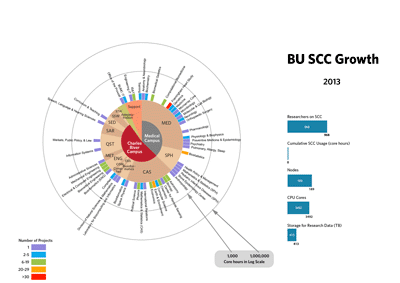Boston University’s Shared Computer Cluster (SCC) is BU’s high performance computing resource, located in the LEED Platinum certified Massachusetts Green High Performance Computing Center (MGHPCC) in Holyoke, MA. Since its launch in June of 2013, both the SCC and the research computing community using the system have grown steadily skyward.

Detailed slides of the SCC’s growth between June 2013 and December 2019 can be viewed at: rcs.bu.edu/PR/scc-growth/
Today the system has 14,600 CPU cores and 4.2 petabytes (that’s 4,200,000,000,000,000 bytes) of storage for research data. This includes many specialized compute nodes to enable jobs that require very large amounts of memory. The current 2,240 researchers using the SCC on 725 projects hail from 80 departments and centers across both campuses. Researchers have done over 161 million hours of computation on the SCC!
Managed by IS&T’s Research Computing Services (RCS) team, SCC’s system growth is supported both by the University, and by the highly successful buy-in program, which gives researchers the opportunity to acquire cost-effective compute and storage resources to directly support their own research goals while also helping the rest of the SCC community. Additionally, RCS conducts a rigorous training series each semester and provides individualized consulting and training to researchers, their labs, and students in courses utilizing the SCC.
The community using the SCC includes a wide range of disciplines, from the physical sciences and engineering to emerging computational communities such as biostatistics, bioinformatics, genomics, neuroscience, machine learning, public and global health, economics, finance, the social sciences, microbiology, and infectious diseases. Some of the community members include:
Professor John Clarke of the Center for Space Physics, working with graduate student Dolon Bhattacharyya, used the SCC to simulate the escape of water from the Martian atmosphere. This process, which took days on a personal computer, only took hours using the compute power of the SCC. By comparing their model with observations from the Hubble Space Telescope, their team was able to trace the history of what may have been a planet capable of sustaining life to the Mars we know today.
Allen Chang, a PhD candidate studying with Professor Chantal Stern in the Cognitive Neuroimaging Lab, is investigating how we can generalize learning across novel tasks. He was able reduce his data processing time from days to hours using the SCC. See the RCS Highlights webpage for more information on the project.
Recent Physics PhD, Marin Bukov, studying with Associate Professor Panjak Mehta, used the SCC in his research on applying machine learning to problems in physics. Their work involved the use of a reinforcement learning algorithm to create a solution to a difficult control problem in quantum computing.
For additional information about the SCC, please visit the RCS web site or contact RCS staff at rcs@bu.edu.
